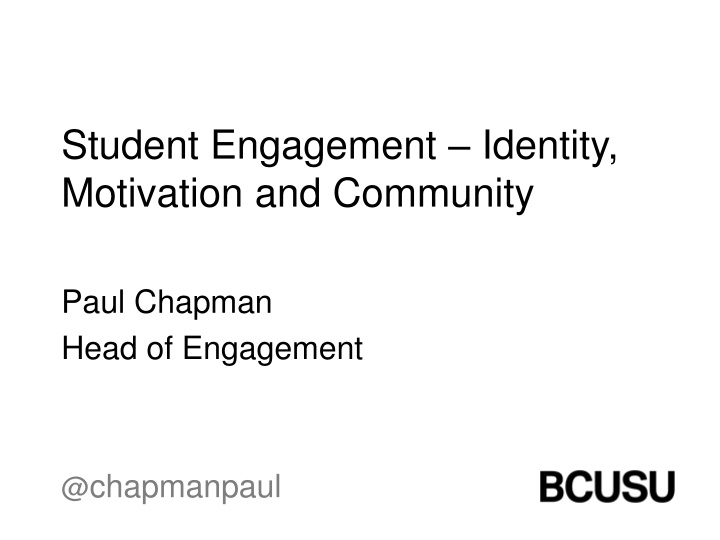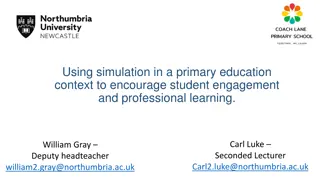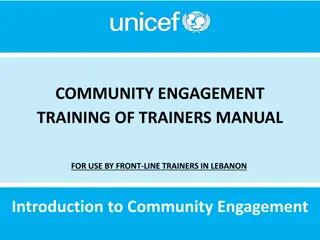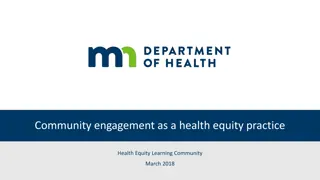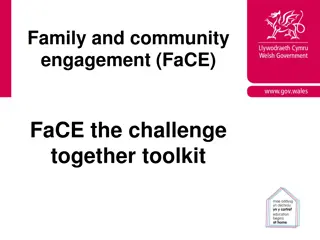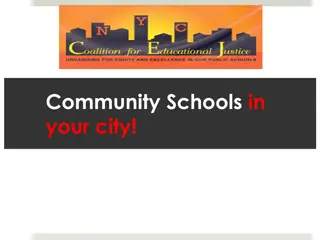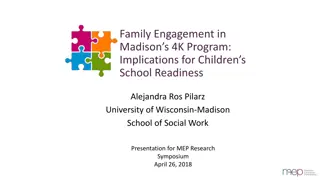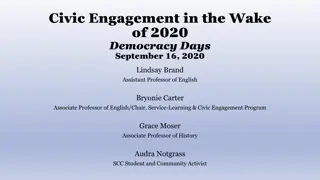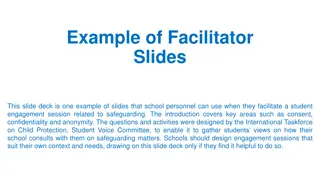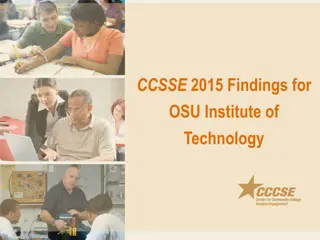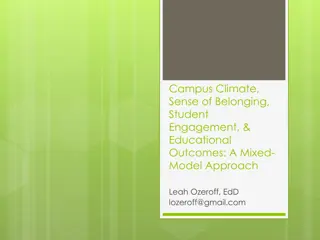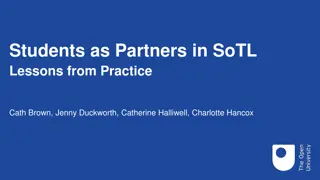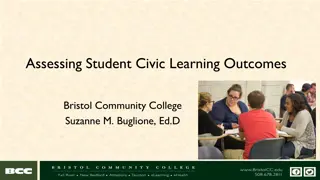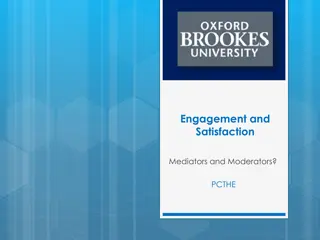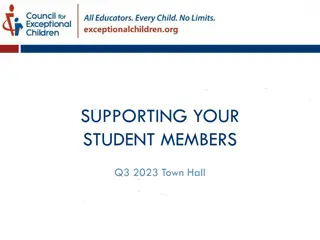Student Engagement and Community Focus at BCU
At BCU, student engagement is key with a focus on community building and partnership. Through initiatives like Student Academic Partners, the institution empowers students to co-create their learning experience, fostering a vibrant educational environment.
Download Presentation

Please find below an Image/Link to download the presentation.
The content on the website is provided AS IS for your information and personal use only. It may not be sold, licensed, or shared on other websites without obtaining consent from the author.If you encounter any issues during the download, it is possible that the publisher has removed the file from their server.
You are allowed to download the files provided on this website for personal or commercial use, subject to the condition that they are used lawfully. All files are the property of their respective owners.
The content on the website is provided AS IS for your information and personal use only. It may not be sold, licensed, or shared on other websites without obtaining consent from the author.
E N D
Presentation Transcript
Student Engagement Identity, Motivation and Community Paul Chapman Head of Engagement @chapmanpaul
BCU Context ~24,000 Students 8 to 2 campus estate strategy 4 Faculties Emphasis on learning and teaching Vocational approach Local and well defined multicultural communities Regional focused Increasing attention on student engagement
Definitions Do you have an agreed definition of student engagement that you work with at your institution?
Definitions Do you have an agreed definition of student engagement that you work with at your institution? Yes = No =
Definitions Can you type your definition of student engagement into the chat room for comparison later?
Results Does this matter? Do we need a shared definition? How can we do student engagement if we don t know what it is? Does it vary between person / department / role?
BCU from 2008 Discussions based around Fielding (2001) Students as Radical Agents of Change A new philosophy - Generating the Learning Community (NSS / SES feedback) Co-creation of the learning experience through students as partners - Recipient / Consumer / Participant / Partner Focus on partnership: with Students and with the Students Union
Student Academic Partners 2009 present Funding for around 100 hours student employment, Around 50 projects a year (339 total to date) Main project themes: Development of new content: Learning / resources / assessment approaches / curriculum focus Consultation: Survey / networking projects / community building /student engagement focus Employability: Employment / professional practice and placement experience Thematic: progression / retention / mentoring / internationalisation
Student Academic Mentors Total number of StAMP projects (90 overall) around 1000 per project Year 1 (2011/12) 20 Year 2 (2012/13) 21 Year 3 (2013/14) 20 Year 4 (2014/15) 29 Discussion Group Mentoring Workshop Mentoring One on One Academic Assistance Mentoring / Coaching Teaching Assistant Mentoring Course Induction Mentoring Employability Mentoring Placement Mentoring
Student Academic Partners & Student Academic Mentors If you have a similar type of scheme at your institution let us know in the chat room
Interdisciplinary Projects Projects at 5-10k per project ~200 students engaged Continue to broaden the Learning Community away from silos Building upon SAP and StAMP characteristics Large-scale, cross-disciplinary projects that provide opportunities for student and staff partnerships Process will be at least as important as product
OpportUNIty Student Jobs Project from HEA Change Academy Establishing University HR within Student Engagement Over 1,165 roles developed in year 1 Links with skills analysis, development and reflection Roles ranging from front line delivery, library assistants, Student Liaison Officers and Programme Success Partners
Student Employment What barriers have you faced / would you face when setting up student employment schemes at your institution? Let us know in the chat room
ARTicle Press A short video clip providing an overview of a recent project in the School of Art https://www.youtube.com/watch?v=eNbWwt WUNJ8
A pause for questions / comments / a flick through the chat room
Types of Partnership For the Individual ( as Producers, Partners, Change Agents) For the Collective (Institutional Governance: Uni. Policy and Practice) For Participation (Decision-Making, Democracy, Citizenship)
More resources on theory Change Agent Network http://can.jiscinvolve.org/wp/ The Student Engagement Partnership www.tsep.org.uk/ Higher Education Academy www.heacademy.ac.uk/workstreams- research/themes/students-partners
A winning approach? Identity Motivation Community Student Success?
Identity changing nature of student, staff and organisational identities Producer, Collaborator, Partner, Student, Employee, Change Agent the student as a practitioner partner (added resource), an asset that can support innovation and development. the role of students in the organisation and the impact this has on their own perceptions and those of students and staff: Power and Control new relationships that have been developed across the university conflated identity of students as staff and the impact this has upon them within the community
EMPHASIS STUDENTS AS PARTICIPANTS IN DECISION-MAKING PROCESSES STUDENTS AS EVALUATORS OF THEIR HE EXPERIENCE (THE STUDENT VOICE) ON THE Students engage in institutional decision-making, in order to influence enhancement and change. Decisions for action tend to be taken collaboratively with staff and students. STUDENT VOICE Students offer feedback, views and opinions and are listened to on an institutional basis, in order to build an evidence-base as a basis for enhancement and change. Decisions for action tend to be taken at subject and/or institutional level. BCSU Examples: Student Representatives Student Advisory Boards Student Councils Student Partnership Agreement BCSU Examples: Extra Mile Teaching Awards Formal and Informal Student Voice Activity Students engaged in Quality systems Integrating students into educational change EMPHASIS ON THE UNIVERSITY AS DRIVER EMPHASIS ON THE STUDENT AS DRIVER STUDENTS AS PARTNERS, CO- CREATORS AND EXPERTS STUDENTS AS AGENTS FOR CHANGE Students are collaborative partners in curriculum provision and professional development, in order to enhance staff and student learning. Decisions for action tend to be taken at subject and/or institutional level. Students are collaborative partners in pedagogic knowledge acquisition and professional development, with the purpose of bringing about change. Decisions for action tend to be promoted by students and engaged with at subject and/or institutional level. BCSU Examples: Student Academic Partner Projects OpportUNIty Collaborative Projects BCSU Examples: Student Academic Partner Projects OpportUNIty Collaborative Projects Student and Graduate Interns Student Academic Mentors EMPHASIS ON STUDENT ENGAGEMENT
Students are more than students 1) Mentor 2) Partner 3) Collaborator 4) Expert 5) Change Agent 6) Employee 7) Evaluator / Reviewer 8) Representative 9) Leader (Academic / non- Academic)
Students are more than students How many of these titles and labels are present on your campus? 1) Mentor 2) Partner 3) Collaborator 4) Expert 5) Change Agent 6) Employee 7) Evaluator / Reviewer 8) Representative 9) Leader (Academic / non- Academic) Vote!
Students are more than students A = 1-2 B = 3-4 C = 5-6 D = 7-8 E = 9 1) Mentor 2) Partner 3) Collaborator 4) Expert 5) Change Agent 6) Employee 7) Evaluator / Reviewer 8) Representative 9) Leader (Academic / non- Academic)
Motivation Student A. Financial support for student life B. Impact of future: Employability C. Academic skills development: Research skills and core competencies D. Increased student voice within their area E. Altruism
Motivation Staff A. Additional resource B. Increased knowledge for content C. Increased ability for delivery D. Narrowing the gap between students and staff E. Strengthening cohort cohesion
Community Creation of a community at modular, school, faculty and university level Awareness of the other side of the coin Showcase the role of students as practitioners in community projects and the benefits this has upon student learning: Situational engagement The role of students, Students Unions and the institution in the new student engagement conversations
E = Part of the academic environment A = Separate B = A Service C = A function to create a society
Student Engagement Conference A short video of our inaugural internal conference on student engagement https://www.youtube.com/watch?v=PEdYe1ttuX Q
Thank You! paul.chapman@bcu.ac.uk www.bcusu.com www.bcu.ac.uk/about-us/celt @chapmanpaul
